Double Indemnity (1944)
Directed by: Billy Wilder
Written by: Billy Wilder, James M.Cain, Raymond Chandler
Starring: Barbara Stanwyck, Edward G.Robinson, Fred MacMurray, Porter Hall
HCF may be one of the newest voices on the web for all things Horror and Cult, and while our aim is to bring you our best opinion of all the new and strange that hits the market, we still cannot forget about our old loves, the films that made us want to create the website to spread the word. So, now and again our official critics at the HCF headquarters have an urge to throw aside their new required copies of the week and dust down their old collection and bring them to the fore…. our aim, to make sure that you may have not missed the films that should be stood proud in your collection.
To celebrate it’s upcoming release on Blu Ray, Doc takes another look at a classic example of what is known as film noir, a truly great thriller which seems as fresh today as it did back in 1944.
HCF REWIND NO.57. DOUBLE INDEMNITY [1944]
AVAILABLE ON BLU RAY AND DVD
RUNNING TIME: 102 mins
REVIEWED BY: Dr Lenera, Official HCF Critic
Walter Neff, a successful insurance salesman for Pacific All Risk, returns to his office building in Los Angeles late one night. Clearly in pain, he he sits down at his desk and begins dictating a memo into a Dictaphone machine for colleague Barton Keys, a claims adjuster. We flashback to when Walter first meets the sultry Phyllis Dietrichson during a routine house call to renew an automobile insurance policy for her husband. A flirtation develops, at least until Phyllis asks how she could take out a policy on her husband’s life without his knowing it. Neff realizes she is contemplating murder and leaves, but Phyllis pursues Neff to his own home, and Walter’s gullibility and libido quickly overcome his caution. He agrees that the two of them, together, will kill her husband. Walter, knowing all the tricks of his trade, comes up with a plan in which the death will seem accidental and trigger the “double indemnity” clause of the policy, forcing Pacific All Risk to pay the widow twice the normal amount……..
Suddenly it came over me that everything would go wrong. It sounds crazy, Keyes, but it’s true, so help me. I couldn’t hear my own footsteps. It was the walk of a dead man.
Though I think that there are a few films that would be on most people’s lists, we all have different ideas about what are truly great motion pictures, and to extent our opinion is influenced somewhat by our taste. I am sure, for example, that all of us who write for this here website would include more horror moves in a ‘Top 50’ than many other critics. Double Indemnity isn’t one of those films that I have automatically come to mind when I think of the best ever movies, and yet maybe it should be, because whenever I sit down to watch it, I find it be almost flawless! The story never fails to grip, the dialogue never fails to shine, the direction never fails to impress , the acting never fails to make me believe in the characters, the pace is perfect; in short, it never really puts a foot wrong! It doesn’t even come across as seeming that dated; it may be from 1944, but it seems very modern and timely in its attitude and feel.
It was the third film to come from Billy Wilder, who these days rarely seems to come to mind when people think of the all-time great movie directors, but made some true classics and generally maintained a very high quality throughout his career. Sunset Boulevard, Some Like It Hot, The Apartment, The Lost Weekend, nearly all of his films are very good, though my favourite may be one of his less heralded works, The Private Life Of Sherlock Holmes, despite it being mutilated by the studio. Double Indemnity saw Wilder, who always co-wrote his films, collaborate with the great writer Raymond Chandler, though the two actually drove each other mad, with Chandler, an ex-alcoholic, going back to the bottle! Somehow though, this tension resulted in a screenplay which is pure genius from beginning. It managed to improve on the 1935 novella from James M.Cain, who had based his story on a true-life 1927 murder where a woman persuaded her boyfriend, Judd Gray, to kill her husband Albert after having him take out a big insurance policy. The property had actually been in Hollywood for some time but neither the studio heads nor the censors wanted anything to do with what was seen in a sordid tale unsuitable for wide public viewing until it landed on Billy Wilder’s desk.
The impact Double Indemnity made upon release was incredible, because people just hadn’t seen anything like it. Here was a film that not only dealt with subjects generally considered taboo, such as adultery and premeditated murder, but had these acts committed by people who were the two main characters of the piece. Audiences were given the chance to experience the thrill of breaking the law and even sympathise with the folks doing it. Though there had a few film noir films before it, it was Double Indemnity that ushered in a rush of similar films that borrowed not only elements of the story but the ground-breaking look of the film. Suddenly darkened rooms, silhouetted shadows, anti-social characters, sordid double-dealing, sexual blackmail and an overall tone of pessimism was in, all of which seemed to chime with the feelings of post-World War 2 disillusionment. It helped that these films could be made cheaply. Double Indemnity was a direct influence of many successors who had duplicitous femme fatales, foolish ‘heroes’ who get caught up in a nightmare from which they cannot escape, and lots and lots of dark lines in shadow caused by blinds, an easy way to give the impression that characters are imprisoned in their world.
Indeed it’s the look of Double Indemnity that is perhaps the first thing that would really strike a first time viewer who may have already seen several similar stories about men who get involved with women who are manipulative and married [my favourite after Double Indemnity is the 1981 Body Heat where Kathleen Turner almost out-femmes Barbara Stanwyck]. Black dominates many shots, often to the point where you can barely see anything. Walter’s apartment is so dark and gloomy you wonder how he can ever want to live there. Shadow is used cleverly and subtly throughout; on this viewing, I noticed how, the moment the subject of murder is brought up, darkness falls across one side of Neff’s face, but it’s brief and doesn’t call attention to itself. This time, I also wondered if the grand office set is deliberately intended to resemble a prison, a prison from which Walter wants to escape from, a prison full of people who have their hopes and dreams about getting out, but few with both the courage and the stupidity of Walter.
The relationship between Walter and Phyllis is one of harmless flirtation at first, and interestingly it’s Neff who first brings up the subject of murdering her husband, who is immediately presented as a character whom the world may very well be better off without. A shot of the two on a settee, with Walter lighting a cigarette and Phyllis putting on her make-up, indicates they have just had sex, and that’s all we need, because the sexual chemistry literally oozes off the screen. Then it’s on to the murder, and the actual act is played out over Phyllis’s face as she subtly reveals several differing but linked emotions, none of them nice, in a few seconds. What brilliant acting! After this, the film becomes a kind of descent into Hell as the net closes in on Walter, who is a trapped in a nightmare partly of his choosing. If you’re seeing Double Indemnity for the first time, the twists and turns are startling; if you’re seeing it for the umpteenth time, you may be like me and still pray for this poor sap to break free, for even the both of them to just get away with it, such is the film’s power. There are no gunfights or chases, but the picture’s vice-like grip, which gets tighter and tighter until it becomes almost painful, is incredible.
Although the story hinges on the relationship between Walter and Phyllis, a relationship which is kept tantalisingly vague in that we never know whether Phyllis actually loves Walter or not [there is a moment where she seems to, but is she pretending?], its human centre is actually the friendship between Walter and his co-worker Barton Keys, who has a nose for, and even seems to ‘get off on’ sniffing out anything from petty larceny to murder, all from the piles of insurance claims that land on his desk. He’s actually more interested in crime than Walter, but his morality prevents him from even thinking about committing a bad act. Their relationship is one of great trust, respect and even love, though I won’t go as far to suggest there is a homosexual aspect. Nonetheless, Walter ends up breaking Barton’s heart and you feel the pain. Wilder originally shot an ending with Walter going to the gas chamber, but fortunately did not use it, instead opting for the emotional and heavily symbolic finale we now have. The most ‘normal’ character in the film is actually Phyllis’s stepdaughter Lola, who seems to represent the goodness in humanity and seems to offer a gateway to partial redemption for Walter. Double Indemnity is a cynical film, there’s no doubt about it, but it’s actually less cynical than some later Wilder works like Sunset Boulevard and Ace In The Hole. Walter, in the end, does succeed in doing a bit of good, and possibly saves himself from the lowest circle of Hell.
Of course the dialogue sparkles throughout, you could just listen to this movie and not actually watch it at all. There’s the respectful , if barbed, bickering between Walter and Barton:
Barton : How would you like a $50 cut in pay?
Walter : Do I laugh now or wait until it gets funny
And the innuendo-filled talk between Walter and Phyllis:
Phyllis: My husband. You were anxious to talk to him weren’t you?
Walter: Yeah, I was, but I’m sort of getting over the idea, if you know what I mean.
Phyllis: There’s a speed limit in this state, Mr. Neff. Forty-five miles an hour.
Walter: How fast was I going, officer?
Phyllis: I’d say around ninety.
Walter: Suppose you get down off your motorcycle and give me a ticket.
Phyllis: Suppose I let you off with a warning this time.
Walter: Suppose it doesn’t take.
Phyllis: Suppose I have to whack you over the knuckles.
Walter: Suppose I bust out crying and put my head on your shoulder.
Phyllis: Suppose you try putting it on my husband’s shoulder.
The three main performers deliver their lines perfectly throughout, and, while Barbara Stanwyck usually gets most of the credit as possibly the greatest femme fatale ever put on screen, a performance that is wonderful to just sit and study because of all the subtle detail in it, one must emphasise how good Fred MacMurray, who was usually a light comedian but had the role of a lifetime in Walter, and Edward G.Robinson, who has some of the longest speeches as Barton, are too. Miklos Rozsa’s score, full of foreboding and with a love theme that, cleverly, always seems struggling to reach the romantic peaks you expect it to, is superb throughout and was so effective he would be mostly scoring similar films for the next few years. Double Indemnity is simply superb in every way. Few films convey so well the ease with which someone can sink into evil, and few films convey the attractiveness of that evil, yet few films do it so entertaining. Every ingredient, made by people who were all working at the top of their form, combines to form a masterpiece which will never be matched of its kind.
Rating: 









The upcoming R2 Blu Ray release from Eureka of Double Indemnity includes:
* new high-definition restoration
* Shadows of Suspense — a 2006 documentary featuring film historians, directors, and authors discussing the making of Double Indemnity
* 1945 Screen Guild Theater radio adaptation of Double Indemnity, starring Barbara Stanwyck and Fred MacMurray
* The original theatrical trailer
* PLUS: A 36-page booklet featuring rare articles, images and more

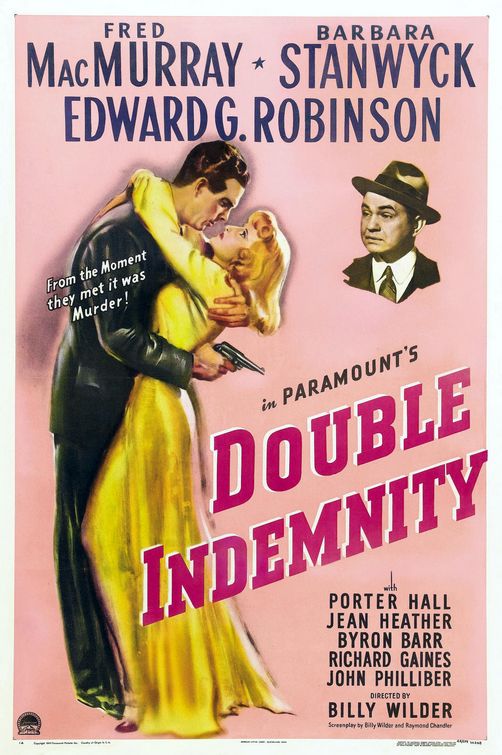
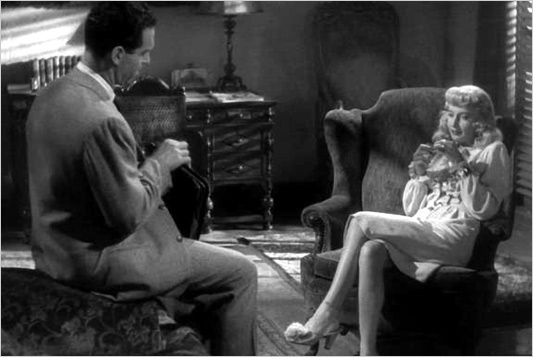
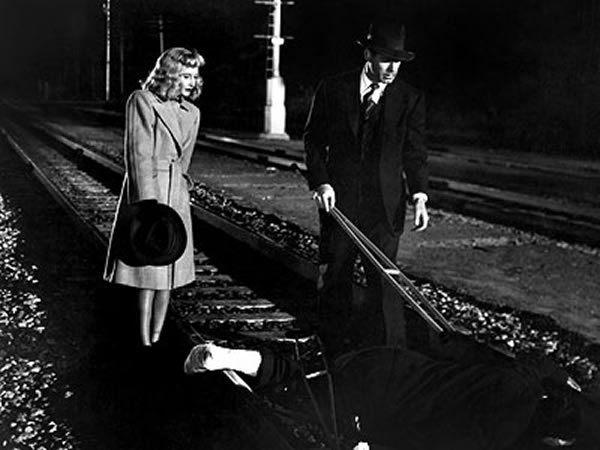
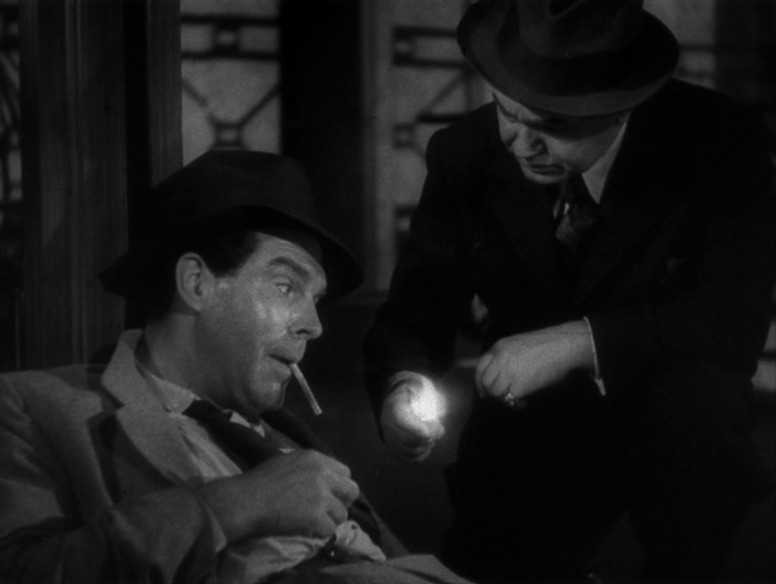

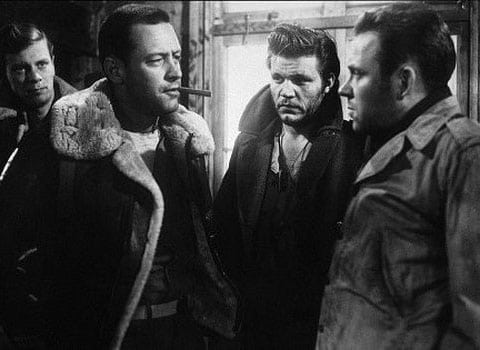
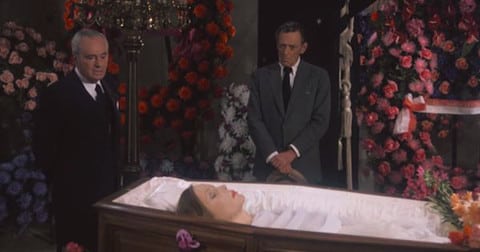
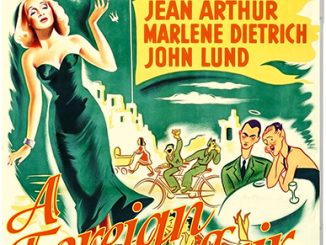
Be the first to comment